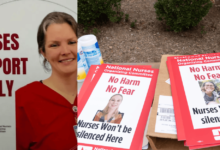Women Leaders in Healthcare and Oncology

Women have a long and storied history when it comes to healthcare and more importantly leadership roles. The first woman to receive a medical degree in the United States is Elizabeth Blackwell. She gained her medical degree in 1849. A year after the American Association for Cancer Research (AACR) was founded, the first female doctor was admitted into the organization, and her name was Martha Tracy, MD, DrPH. She was instrumental in the development of “Coley’s Toxins,” widely recognized as one of the very first effective immunotherapeutic agents. From 1917 to 1940, she was Dean of the Women’s Medical College of Pennsylvania, and she became a renowned researcher and medical professor. Recent developments in the AACR have led to the creation of the AACR-Women in Cancer Research (WICR) which was founded in 1998. The membership group recognizes women’s scientific accomplishments and fosters their career development to develop a more equal cancer workforce. The WICR has a report that highlights and celebrates many of the achievements of women in cancer research and management or board membership roles.
Into the Numbers of Women in Academia Medicine
According to the State of Women in Academic Medicine report, which has statistics dating all the way back to 2013, the proportion of women in medical oncology continues to grow, accounting for slightly more than 30% of oncologists practicing in the United States.
The number of women graduates from medical schools is 47%, but their numbers are smaller in academic roles (38%); full professorships (21%); and leadership roles (between 15% and 16%). Over the next six years, the demand for oncologists is expected to grow by 40%. Women’s healthcare is particularly affected by this shortage since cancer is the second leading cause of death for women in the United States.
Who Are Some of the Most Recent Female Leaders in Oncology
Starting from the most recent award, which was in 2021, the LEADS Woman Awards females leaders in two separate categories. The first category is “Oncologist of the year” and the second award is “Rising Star”.
- Last year the oncologist of the year was Pamela Kunz, MD, and the rising star award went to Ana Velazquez Manana, MD.
- In 2020, the oncologist of the year was awarded to Reshma Jagsi, MD, DPHIL, and the rising star award went to Narjust Duma, MD.
- In 2019, the oncologist of the year award went to Claire Verschraegen, MD, and the rising star award went to Shikha Jain, MD, FACP
You can read more about their stories and contributions here.
How Has COVID-19 Affected Progress of Women Leaders in Oncology
The pandemic has impacted everyone, and none more so than frontline healthcare workers. With people having to stay in place to shelter and isolate, it has created issues with progress with women moving forward with progress in all forms of leadership, work in general, and education. Today, women still disproportionately take care of more of the housework, children, and domestic tasks. According to a study, Covid-19 has also hindered the academic progress of future women healthcare workers and leaders striving for productivity and professional development. But with restrictions starting to lift, the progress is starting to normalize and actually benefit future women in healthcare positions.
How is Nursa™ Helping Women Leaders Prepare for the Future
Nursa™ is an innovative application helping women in healthcare find per diem shifts that the public, hospitals, and healthcare facilities desperately need. Nursa™ especially helps out registered nurses (RNs), certified nurse assistants (CNAs), and licensed practical nurses (LPNs).
With Nursa™ more healthcare workers are getting better pay, and more experience within their specialties, hospitals and healthcare places are getting better coverage in patient care, and the public benefits because with the per diem shifts being covered the wait time for much-needed healthcare is becoming more streamlined.
Nursa™ is an easy-to-use application for both healthcare workers and healthcare facilities. All you have to do is download the application and answer a few questions, and upload a few necessary documents, and RNs, CNAs, and LPNs are able to start applying to per diem shifts that they want. The best part about the application is that you can use it all over the country and offers people to travel and explore new cities, and gain new valuable information and education geared directly toward skills for future growth and betterment.






